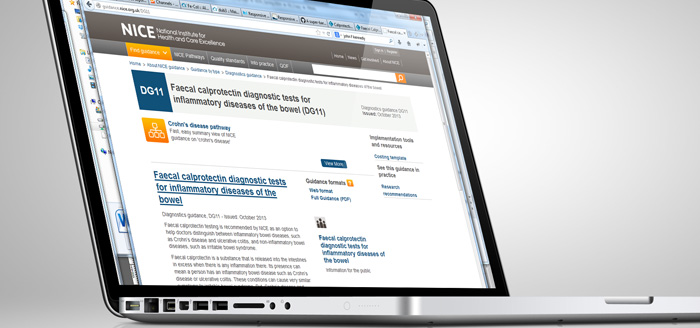Faecal calprotectin testing hit the news headlines late last year following publication of the NICE diagnostic guidelines: ‘Faecal calprotectin diagnostic tests for inflammatory diseases of the bowel’ (DG11).
Measurement of faecal calprotectin is considered to provide a reliable indicator of gastrointestinal (GI) tract inflammation and numerous studies show that, while faecal calprotectin concentrations are significantly elevated in patients with inflammatory bowel disease (IBD ), patients suffering from irritable bowel syndrome (IBS) do not have increased calprotectin concentrations. Elevated concentrations are shown to correlate well with both endoscopic and histological assessment of disease activity.
What do the NICE guidelines mean in practice?
NICE advises doctors to use simple faecal tests as an option to distinguish between potentially serious IBD and less serious IBS. The new guidelines advocate the use of faecal calprotectin testing as a first-line assessment for patients presenting with GI symptoms indicative of IBD or IBS. This is sure to lead to a change in current clinical practice.
The Director of the NICE Health Technology Evaluation Centre, Professor Carole Longson, said:
“It is important to distinguish IBD from IBS so that patients can be appropriately managed and monitored. Bowel disorders can be difficult to diagnose, but the treatments and outcomes can be very different. Faecal calprotectin testing helps doctors to distinguish between non-inflammatory disorders like IBS, where sufferers will not come to serious harm, and IBD such as Ulcerative Colitis or Crohn’s disease,which need to be quickly referred to specialists.”
“Looking at the available evidence, we found that faecal calprotectin testing is a good way to distinguish between IBD and IBS. As well as being of benefit to patients, the tests will save the NHS money. They will reduce both the time spent searching for a diagnosis and the numbers of invasive procedures such as colonoscopy. The test is also likely to reduce the demands on colonoscopy departments which will be able to focus on people being investigated for more serious conditions such as bowel cancer.” 1
Cost-savings are estimated to be in the region of £180,000 per 100,000 of the population. As a result, it is expected that faecal calprotectin measurement in patients presenting with lower GI symptoms will be adopted quickly by CCGs and Hospital Trusts.
Alpha Laboratories has much experience in calprotectin testing and supplies the market leading range of assays from Buhlmann. From point-of-care to the medical laboratory, our range provides consistent, reliable and accurate results to aid the clinician in the diagnosis of IBD/IBS.
References
National Institute for Health and Care Excellence. Faecal calprotectin diagnostic tests for inflammatory diseases of the bowel. DG11, NICE, 2013: http://guidance.nice.org.uk/DG11

